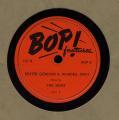
Jazz history is sometimes – too often! – told as a sequence of turning points – a journey from one seminal moment to another, lingering at the milestones where everything – cultural, aesthetic, and even political – supposedly coalesces into "the new." One of these moments happened sixty years ago at the Elks Club on Central Avenue in Los Angeles. On July 6, 1947, Wardell Gray and Dexter Gordon locked musical horns with their tenor saxophones. Portions of the night's playing were released on a series of four 78s on the Bop! Records label. Appropriately titled The Hunt, this two-tenor duel, with Wardell Gray and Dexter Gordon alternately chasing and outdoing each other, was spread over 8 parts of three minutes each.
But, apart from the sheer excitement of the battle, why is this concert so mythological and historically significant? After all, both musicians had dueled before; one month earlier, they recorded The Chase, a much more commercially successful recording, which was released on Dial Records on two sides of a 78. (The Chase was so successful that The Hunt was marketed as merely a Grey-Gordon duel although their session was only part of a full night's gig that included musicians such as Howard McGhee, Sonny Criss, and Hampton Hawes, playing brilliantly on trumpet, alto saxophone, and piano.) The 1947 musical battle-cum-duet that followed two nights of Independence Day celebrations have become a deliverance moment for that ubiquitous postwar jazz style, bebop. That the concert has become enshrined should be no surprise, though, given the quality of the playing, the mythic quality of the venue, and the stature of the other players who were on hand that night.
